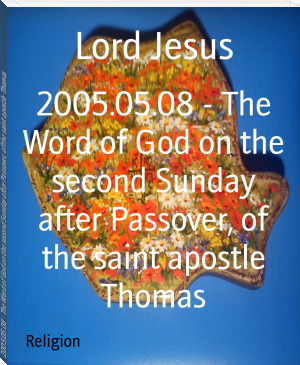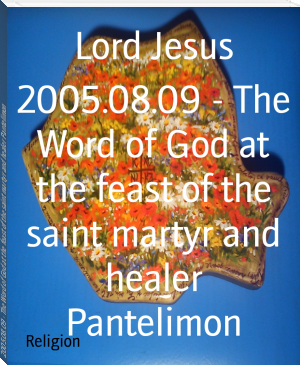The Story of a Soul - Saint Thérèse de Lisieux (best color ereader .TXT) 📗

- Author: Saint Thérèse de Lisieux
- Performer: -
Book online «The Story of a Soul - Saint Thérèse de Lisieux (best color ereader .TXT) 📗». Author Saint Thérèse de Lisieux
My Father proposed to take me to Jerusalem, but in spite of the natural wish I had to visit the places sanctified by Our Lord's Footsteps, I was weary of earthly pilgrimages and only longed for the beauties of Heaven. In order to win these beauties for souls I wanted to become a prisoner as quickly as possible. I felt that I must suffer and struggle still more before the gates of my blessed prison would open; yet my trust in God did not grow less, and I still hoped to enter at Christmas.
We had hardly reached home when I paid a visit to the Carmel. You must remember well that interview, dear Mother. I left myself entirely in your hands, for I had exhausted all my resources. You told me to write to the Bishop and remind him of his promise. I obeyed at once, and as soon as my letter was posted I felt I should obtain the coveted permission without any delay. Alas! each day brought fresh disappointments. The beautiful feast of Christmas dawned; still Jesus slept. He left His little ball on the ground without even glancing that way.
This was indeed a sore trial, but Our Lord, Whose Heart is always watching, taught me that He granted miracles to those whose faith is small as a grain of mustard seed, in the hope of strengthening this slender faith; whilst for His intimate friends, for His Mother, He did not work miracles till He had proved their faith. Did He not permit Lazarus to die even though Mary and Martha had sent word that he was sick? And at the marriage feast of Cana, when Our Lady asked her Divine Son to aid the master of the house, did He not answer that His hour had not yet come? But after the trial what a reward! Water is changed into wine, and Lazarus rises from the dead. In this way did my Beloved act with His little Thérèse; after He had tried her for a long time He granted all her desires.
For my New Year's gift of 1888, Jesus again gave me His Cross. You told me, dear Mother, that you had had the Bishop's answer since December 28, the feast of Holy Innocents; that he authorised my immediate entry into the Carmel, but that nevertheless you had decided not to open its doors till after Lent. I could not restrain my tears at the thought of such a long delay. This trial affected me in a special manner, for I felt my earthly ties were severed, and yet the Ark in its turn refused to admit the poor little dove.
How did these three months pass? They were fruitful in sufferings and still more so in other graces. At first the thought came into my mind that I would not put any extra restraint on myself, I would lead a life somewhat less strictly ordered than was my custom. But Our Lord made me understand the benefit I might derive from this time He had granted me, and I then resolved to give myself up to a more serious and mortified life. When I say mortified, I do not mean that I imitated the penances of the Saints; far from resembling those beautiful souls who have practised all sorts of mortifications from their infancy, I made mine consist in simply checking my inclinations, keeping back an impatient answer, doing little services to those around me without setting store thereby, and a hundred other things of the kind. By practising these trifles I prepared myself to become the Spouse of Jesus, and I can never tell you, Mother, how much the added delay helped me to grow in abandonment, in humility, and in other virtues. ______________________________
[1] Joel 2:19.
[2] Imitation of Christ, III, xxiv. 2.
[3] Isa. 65:15.
[4] Apoc. 2:17.
[5] 1 Cor. 4:5.
[6] Matt. 5:13.
[7] Tit. 1:15.
[8] Montmartre—the "Mount of Martyrs"—is the hill whereon St. Denis, apostle and bishop of Paris, was martyred with his two companions in the third century. It was a famous place of pilgrimage in medieval times, and here St. Ignatius and the first Jesuits took their vows. Under the presidency of Marshal MacMahon, the erection of the well-known Basilica was voted in 1873 by the French Chamber of Deputies as a national act of reparation to the Sacred Heart. [Ed.]
[9] Cemetery.
[10] Cf. Cant. 7:1.
[11] Office of St. Cecilia.
[12] Luke 12:32.
[13] Luke 22:29.
[14] Cf. Matt. 20:22.
[15] Luke 24:26.
______________________________
CHAPTER VII THE LITTLE FLOWER ENTERS THE CARMELMonday, April 9, 1888, being the Feast of the Annunciation, transferred from Passiontide, was the day chosen for me to enter the Carmel. On the evening before, we were gathered around the table where I was to take my place for the last time. These farewells are in themselves heartrending, and just when I would have liked to be forgotten I received the tenderest expressions of affection, as if to increase the pain of parting.
The next morning, after a last look at the happy home of my childhood, I set out for the Carmel, where we all heard Mass. At the moment of Communion, when Jesus had entered our hearts, I heard sobs on all sides. I did not shed a tear, but as I led the way to the cloister door my heart beat so violently that I wondered if I were going to die. Oh, the agony of that moment! One must have experienced it in order to understand. I embraced all my dear ones and knelt for my Father's blessing. He, too, knelt down and blessed me through his tears. It was a sight to gladden the Angels, this old man giving his child to God while she was yet in the springtime of life. At length the doors of the Carmel closed upon me. . . . I found a welcome in your arms, dear Mother, and received the embraces of another family, whose devotedness and love is not dreamt of by the outside world.
At last my desires were realised, and I cannot describe the deep sweet peace which filled my soul. This peace has remained with me during the eight and a half years of my life here, and has never left me even amid the greatest trials.
Everything in the Convent delighted me, especially our little cell.[1] I fancied myself transported to the desert. I repeat that my happiness was calm and peaceful—not even the lightest breeze ruffled the tranquil waters on which my little barque sailed; no cloud darkened the blue sky. I felt fully recompensed for all I had gone through, and I kept saying: "Now I am here for ever." Mine was no passing joy, it did not fade like first illusions. From illusions God in His Mercy has ever preserved me. I found the religious life just what I expected, and sacrifice was never a matter of surprise. Yet you know well that from the beginning my ways was strewn with thorns rather than with roses.
In the first place, my soul had for its daily food the bread of spiritual dryness. Then, too, dear Mother, Our Lord allowed you, unconsciously, to treat me very severely. You found fault with me whenever you met me. I remember once I had left a cobweb in the cloister, and you said to me before the whole community: "It is easy to see that our cloisters are swept by a child of fifteen. It is disgraceful! Go and sweep away that cobweb, and be more careful in future."
On the rare occasions when I spent an hour with you for spiritual direction, you seemed to be scolding me nearly all the time, and what pained me most of all was that I did not see how to correct my faults: for instance, my slow ways and want of thoroughness in my duties, faults which you were careful to point out.
One day it occurred to me that you would certainly prefer me to spend my free time in work instead of in prayer, as was my custom; so I plied my needle industriously without even raising my eyes. No one ever knew of this, as I wished to be faithful to Our Lord and do things solely for Him to see.
When I was a postulant our Mistress used to send me every afternoon at half-past four to weed the garden. This was a real penance, the more so, dear Mother, because I was almost sure to meet you on the way, and once you remarked: "Really, this child does absolutely nothing. What are we to think of a novice who must have a walk every day?" And yet, dear Mother, how grateful I am to you for giving me such a sound and valuable training. It was an inestimable grace. What should I have become, if, as the world outside believed, I had been but the pet of the Community? Perhaps, instead of seeing Our Lord in the person of my superiors, I should only have considered the creature, and my heart, which had been so carefully guarded in the world, would have been ensnared by human affection in the cloister. Happily, your motherly prudence saved me from such a disaster.
And not only in this matter, but in other and more bitter trials, I can truly say that Suffering opened her arms to me from the first, and I took her to my heart. In the solemn examination before my profession I declared—as was customary—the reason of my entry into the Carmel: "I have come to save souls, and especially to pray for Priests." One cannot attain the end without adopting the means, and as Our Lord made me understand that it was by the Cross He would give me souls, the more crosses I met with, the stronger grew my attraction to suffering. For five years this way was mine, but I alone knew it; this was precisely the flower I wished to offer to Jesus, a hidden flower which keeps its perfume only for Heaven.
Two months after my entry Father Pichon was surprised at the workings of grace in my soul; he thought my piety childlike and my path an easy one. My conversation with this good Father would have brought me great comfort, had it not been for the extreme difficulty I found in opening my heart. Nevertheless I made a general confession, and after it he said to me: "Before God, the Blessed Virgin, and Angels, and all the Saints, I declare that you have never committed a mortal sin. Thank God for the favours He has so freely bestowed on you without any merit on your part."
Without any merit on my part! That was not difficult to believe. Fully conscious of my weakness and imperfection, my heart overflowed with gratitude. I had distressed myself, fearing I might have stained my baptismal robe, and this assurance, coming as it did from the lips of a director, a man of wisdom and holiness, such as our Mother St. Teresa desired, seemed to come from God Himself. Father Pichon added: "May Our Lord always be your Superior and your Novice Master!" And indeed He ever was, and likewise my Director. In saying this I do not mean to imply that I was not communicative with my superiors; far from being reserved, I always tried to be as an open book.
Our Mistress was a true saint, the perfect type of the first Carmelites, and I seldom left her side, for she had to teach me how to work. Her kindness was beyond words, I loved and appreciated her, and yet my soul did not expand. I could not explain myself, words failed me, and so the time of spiritual direction became a veritable martyrdom.
One of the older nuns seemed to understand what I felt, for she once said to me during recreation: "I should think, child, you have not much to tell your superiors." "Why do you think that, dear Mother?" I asked. "Because your soul is very simple; but when you are perfect you will become more simple still. The nearer one approaches God, the simpler one becomes."
This good Mother was right. Nevertheless the great difficulty I found in opening my heart, though it came from simplicity, was a genuine trial. Now, however, without having lost my simplicity, I am able to express my thoughts with the greatest ease.
I have already said that Our Lord Himself had acted as my Spiritual Guide. Hardly had Father Pichon become my director when his Superiors sent him to Canada. I was only able to hear from him once in the year, so now the Little Flower





Comments (0)